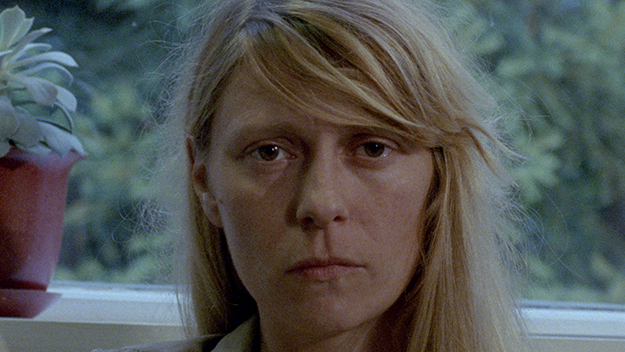Film Comment Recommends: Slow Machine
This article appeared in the June 10 edition of The Film Comment Letter, our free weekly newsletter featuring original film criticism and writing. Sign up for the Letter here.

Slow Machine (Paul Felten and Joe DeNardo, 2020)
Slow Machine’s puckish 16mm cinematography and thematic preoccupations—with performance, conspiracies, terror, and counter-terror—have elicited comparisons to the films of Jacques Rivette and Robert Kramer. But Paul Felten and Joe DeNardo’s feature debut is an undeniably personal statement on our anxious times. Funded in part by Kickstarter donations, the film brings with it a hostile vision of New York: a microcosm of the paranoia and “banal foreboding,” as the protagonist describes it, felt by the hustling creative class, whose lifestyle feels absurdly at odds with a city addled by latent surveillance and deception, to say nothing of toxic relationships.
Working from a script by Felten, the microbudget “thriller” enmeshes Stephanie (Stephanie Hayes), a semi-working Brooklyn actress, in a sinister, flirtatious relationship with Gerard (Scott Shepherd), an NYPD intelligence specialist who rhapsodizes about avant-garde theater, the narrative mechanics of pornography, and thwarted acts of terrorism, among other topics. He may also be linked to clandestine anti-terrorism operations across the country. Or he’s simply out of his mind. After their affair ends poorly, Stephanie adopts a Southern drawl and flees upstate to a ramshackle house where Eleanor Friedberger’s band is recording an album. She bides her time there, waiting for whatever happened in the city to blow over while spurning the sexual advances of a sleazy recording engineer.
If this chain of events sounds peculiar, it’s made even more so by the film’s structure—an abrupt, fragmented, at times nervous construction that snaps back and forth in time and confines its characters to tight, spare frames simmering with a weird and darkly funny atmosphere. One of the film’s eeriest moments features an outstanding cameo by Chloë Sevigny as she and Stephanie discuss the thankless labors of auditioning over alfresco drinks. By the end of the 10-minute sequence, they’ve connected acting to something between ritual magic and death. The episode is hilariously cut short when a disgruntled fan of Sevigny’s calls in a bomb threat to the restaurant. As in many parts of Slow Machine, this scene’s two-shot staging—sporadically crosscut with blink-and-you’ll-miss-them flashbacks—favors rhetorical density and visual minimalism over a linear plot. It’s true to the impulses of a Richard Foreman play, although the film’s eclectic ideas evoke a network of references that extends beyond dramatic literature into ’60s underground cinema and the clipped, remorseful poetry of Philip Larkin, whose “The Life with a Hole in it” supplies the film’s title.







